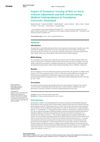 February 2025 in “IntechOpen eBooks”
February 2025 in “IntechOpen eBooks” Postpartum care should address hormonal changes, nutrition, and support to ensure mother and baby well-being.
 August 2024 in “Nutrition Bulletin”
August 2024 in “Nutrition Bulletin” GLP-1 receptor agonists help with weight loss but need to be combined with other treatments for best results.
 July 2024 in “Chinese Medical Journal”
July 2024 in “Chinese Medical Journal” Peripheral blood alive cell treatment is effective and safe for treating hair loss.
March 2024 in “Journal of functional biomaterials” A kimchi-derived bacterium could help whiten teeth and prevent bad breath.
54 citations,
April 2011 in “Journal of Multidisciplinary Healthcare” SLE patients often face depression and anxiety due to physical changes, with African-American and Hispanic patients having higher unmet psychological needs.
 31 citations,
August 2022 in “Frontiers in Oncology”
31 citations,
August 2022 in “Frontiers in Oncology” Photobiomodulation therapy helps manage cancer treatment side effects but needs more research for optimization.
 30 citations,
January 2023 in “EFSA journal”
30 citations,
January 2023 in “EFSA journal” Adults should not consume more than 255 micrograms of selenium per day to avoid risk of hair loss and other side effects.
17 citations,
January 2020 in “The World Journal of Men's Health” Long-term use of finasteride and dutasteride can cause serious health issues like diabetes and liver problems.
 9 citations,
February 2022 in “Genes”
9 citations,
February 2022 in “Genes” Women with PCOS have more Bifidobacterium in their gut compared to those without PCOS.
5 citations,
May 2018 in “Therapeutic advances in drug safety” Androgen use may increase the risk of stroke, but more research is needed.
4 citations,
September 2023 in “Nutrients” Managing diabetes can lead to eating disorders, and eating disorders can make diabetes harder to control.
Early diagnosis and personalized treatment are crucial for managing pediatric androgenetic alopecia.
January 2024 in “Medicina” Statins may help treat PCOS by lowering androgen levels and improving cholesterol.
 January 2022 in “IntechOpen eBooks”
January 2022 in “IntechOpen eBooks” Some lesser-known causes of PCOS include autoimmune issues, genetic mutations, and changes in the body's microbiome.
 2 citations,
January 2014 in “Springer eBooks”
2 citations,
January 2014 in “Springer eBooks” Polycystic Ovary Syndrome (PCOS) often leads to severe acne, and lifestyle changes and hormonal treatments can help manage it.
101 citations,
August 2008 in “Mayo Clinic Proceedings” PAD is common but often missed, needing lifestyle changes and medication for better outcomes.
 August 2022 in “Journal of Contemporary medical practice”
August 2022 in “Journal of Contemporary medical practice” Combining Traditional Chinese Medicine and Western medicine can improve symptoms, hormone levels, and pregnancy outcomes in Polycystic Ovary Syndrome patients, but more research is needed.
27 citations,
August 2008 in “Mayo Clinic proceedings” Early recognition and treatment of Peripheral Arterial Disease is crucial to improve survival and health outcomes.
 1 citations,
July 2022 in “International journal of homoeopathic sciences”
1 citations,
July 2022 in “International journal of homoeopathic sciences” Homoeopathic treatment may help manage polycystic ovarian syndrome.
 6 citations,
December 2022 in “Frontiers in Pharmacology”
6 citations,
December 2022 in “Frontiers in Pharmacology” Quercetin may help improve symptoms of polycystic ovary syndrome.
 12 citations,
February 2022 in “International Journal of Clinical Practice”
12 citations,
February 2022 in “International Journal of Clinical Practice” Oxidative stress is higher in women with PCOS, especially if they're obese, and it may increase their risk of heart disease.
 11 citations,
May 2022 in “Journal of immunology research”
11 citations,
May 2022 in “Journal of immunology research” Breast implants are linked to autoimmune symptoms, with over half of patients feeling better after removal, but the exact cause is unclear and may involve bacterial biofilm.
 October 2010 in “Cambridge University Press eBooks”
October 2010 in “Cambridge University Press eBooks” Lifestyle changes like diet and exercise are key for treating overweight women with polycystic ovary syndrome.
 14 citations,
December 2007 in “Journal of The European Academy of Dermatology and Venereology”
14 citations,
December 2007 in “Journal of The European Academy of Dermatology and Venereology” The article concludes that dermatologists should prescribe lifestyle drugs carefully and consider mental health treatments for patients with disorders like BDD.

Premature greying of hair affects the social lives of medical students but not their self-esteem.
 7 citations,
January 2018 in “International Journal of Dermatology”
7 citations,
January 2018 in “International Journal of Dermatology” AGA risk factors include age, smoking, hypertension for men, and age, dyslipidemia for women; lifestyle changes may help prevention.

research Acne
4 citations,
January 2019 Acne is a common skin condition that can be influenced by diet, lifestyle, and hormones, and requires a treatment approach that includes psychological considerations.
 3 citations,
January 2007 in “Elsevier eBooks”
3 citations,
January 2007 in “Elsevier eBooks” The document concludes that individualized treatment and lifestyle changes are important for managing menopause symptoms and health risks.

Early-onset baldness is linked to genetics, lifestyle, and can indicate higher risk for heart and metabolic diseases, and affects mental health.
 336 citations,
August 2015 in “European Journal of Epidemiology”
336 citations,
August 2015 in “European Journal of Epidemiology” The Rotterdam Study found risk factors for elderly diseases, links between lifestyle and genetics with health conditions, and aimed to explore new areas like DNA methylation and sensory input effects on brain function.





















